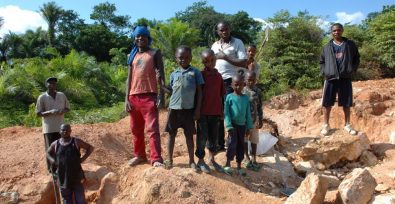As the United States eyes a new minerals-for-security deal with the Democratic Republic of Congo (DRC), experts are sounding the alarm. Without proper safeguards, this move could fuel an increase in forced and child labor in the country’s unregulated mining sector.
The DRC is a major global supplier of cobalt and copper. These minerals are essential to electric vehicle batteries, solar panels, and defense technologies. However, though large mining corporations operate in the country, it’s the artisanal and small-scale mining (ASM) sector that raises the biggest concerns.
“Child labor continues to be a real issue in the copper/cobalt space,” said David Sturmes of the Fair Cobalt Alliance. “Child labor remediation—meaning long-term systemic support—is key.”
US decreases regulatory support while pursuing investment
Efforts to formalize the sector do exist. Earlier this year, the Congolese government updated its mining law to allow companies with industrial permits to integrate artisanal miners onto their concessions in partnership with Entreprise Générale du Cobalt (EGC), a state-owned entity.
According to EGC CEO Eric Kalala, these grants have unfortunately been cut. Without continuous support from governments and international organizations, the responsibility of safeguarding miners’ rights falls once more on underfunded local systems and on companies that have not yet demonstrated their ability to act independently and responsibly.
Why investment without safeguards is dangerous
Experts assert that even with new US investments in large-scale industrial mining, artisanal miners will inevitably pursue these opportunities. Without a framework in place to formalize the sector, exploitation often spreads.
Human rights researcher Dorothée Baumann-Pauly warns that these patterns are predictable — and preventable.
The Wall Street Journal reports,
She said that when major mining operations do start in places like the DRC, it is inevitable that artisanal and small-scale mining takes place on the side of mining concessions, something that can lead to conflict between locals and the mining companies.
Baumann-Pauly added that in those instances, rates of child and forced labor rise with dangerous practices often being employed. She said that mine shafts tens of meters deep are dug out by hand, leading to numerous accidents and fatalities.
What’s clear is that excluding artisanal miners isn’t the solution — but neither is investing without accountability. As the US considers expanding its role in the DRC’s minerals sector, the voices of workers, advocates, and children at the center of the supply chain must be part of the conversation.
A cautionary tale: Tesla
The world is already watching one of the most high-profile companies in the EV space—Tesla—for its ties to cobalt mined under exploitative conditions.
Right now, Freedom United is campaigning to hold Tesla accountable for its cobalt supply chain. Tesla sources cobalt from companies with well-documented human rights risks, including Glencore and Chinese suppliers linked to ASM operations.
The company has refused to publicly disclose its full list of suppliers or submit to independent audits. And when questioned about child labor in its supply chain, Elon Musk’s now-infamous response—“Maybe we should just put a webcam at the mine”—showed just how unserious the company takes these concerns.
This is why Freedom United, along with other human rights advocates, is calling for Tesla to audit and disclose its supply chain, support redress for affected communities, and invest in long-term solutions to prevent forced child labor across the industry. Join the call by taking action today.







Freedom United is interested in hearing from our community and welcomes relevant, informed comments, advice, and insights that advance the conversation around our campaigns and advocacy. We value inclusivity and respect within our community. To be approved, your comments should be civil.